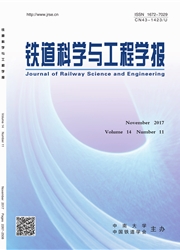

 中文摘要:
中文摘要:
为研究地下水渗流对隧道稳定性的影响,将基于流固耦合的强度折减法用于求解隧道安全系数。通过建立3种计算工况,分析地下水渗流、流固耦合计算模式对隧道安全系数的影响。利用流固间接耦合计算模式研究地下水水位对隧道安全系数和拱顶沉降的影响。结果表明:地下水渗流情况下隧道安全系数较不考虑地下水时降低20%左右,地下水渗流对隧道安全系数的影响不可忽略。流固间接耦合和完全耦合模式计算得到的隧道安全系数基本相同,而流固间接耦合模式所消耗的计算时间远小于完全耦合模式,建议采用流固间接耦合模式计算地下水渗流时隧道的安全系数。隧道安全系数随地下水水位升高有所降低,二者呈线性相关;地下水水位每升高10 m,隧道安全系数降低0.26。相同折减系数时,隧道拱顶沉降随地下水水位升高而增大。
 英文摘要:
英文摘要:
During the construction period of tunnels, groundwater seepage may lead to large deformation and even collapse of tunnel. To study the effect of groundwater seepage on stability of tunnel, the strength reduction method considering ,uid solid coupling was employed to calculate safety factor of tunnel by using numerical simulation. Firstly, three working conditions were established to investigate the effect of groundwater seepage and calculation mode on safety factor of tunnel. Then the fluid solid indirect coupling mode was adopted to investigate the relationship between safety factor and groundwater level. Numerical results show that safety factor considering groundwater seepage is about 2 0 % less than that without considering groundwater seepage. Numerical results of two calculation modes are almost identical, but the computational time of fluid solid indirect coupling mode is far less compared with that of fluid solid coupling mode. Safety factor of tunnel linearly decreases with the increase of groundwater level, with the slope of 0.26. Moreover, tunnel crown settlement increases with the increase of groundwater level when the strength reduction factor is equal. Groundwater seepage is unfavorable to control tunnel deformation. In the watery zone, groundwater level should be lowered to improve stability of tunnel on condition that it does not seriously affect surrounding environment.
 同期刊论文项目
同期刊论文项目
 同项目期刊论文
同项目期刊论文
 期刊信息
期刊信息
